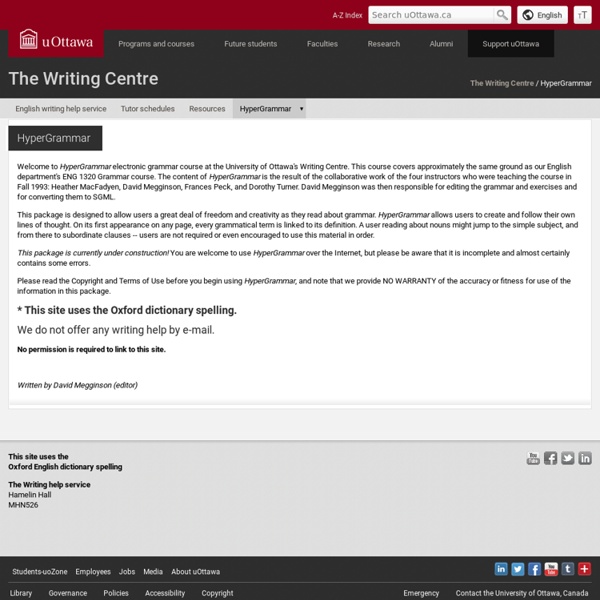Irregular verbs again
I have already published several posts on irregular verbs: Past participles – divided according to the pronunciation and Present perfect tense. However, a week ago a student of mine contacted me and asked me if I could create a way for him to learn the irregular verbs. He spends a lot of time driving so he asked me to prepare something to listen to in his car. So I did.
GRAMBO
It is only a test Actually, it isn't even a test And it contains more than grammar Oh, never mind.... Onward... 1.
How to Use English Punctuation Correctly (with examples)
Steps Part 1 Using Proper Capitalization
40+ Tips to Improve your Grammar and Punctuation
After all these years you finally have the courage and opportunity to write the email announcing that you and you alone have single handedly saved the company from utter disaster. You’re excited, you type it, you spell check it, and you hit send.Everything is great except that your gold star memo has dangling modifiers, double negatives and run-on sentences colliding with each other. Now I am no grammar whiz but I know a good resource when I see it.
Fun 1st Conditional Practice
Stimulating ways of practising “If + Present Simple, Will” sentences in the classroom. There are so many fun things that you can do with the first conditional that there is a danger of spending far too much time on it, so please read through the list below and select a couple rather than working your way through them! 1. Negotiations The first conditional is often used in sentences like “If I give you a lift to the station, will you lend me your car for the rest of the day?” This can be made more fun by asking them to make up sentences that they are sure their partner will accept or reject (e.g. depending on the cards they have been given).
Grammar resources - University of Chicago Writing Program
An annotated collection of grammar and writing resources from around the web. A word of advice: grammar is not math We've selected the sites on this list because on the whole, we think they're pretty good. But "rules" in writing -- unlike, say, rules in Newtonian physics -- are not written in stone.
How to Write an A+ Research Paper
This Chapter outlines the logical steps to writing a good research paper. To achieve supreme excellence or perfection in anything you do, you need more than just the knowledge. Like the Olympic athlete aiming for the gold medal, you must have a positive attitude and the belief that you have the ability to achieve it. That is the real start to writing an A+ research paper. Choose a topic which interests and challenges you. Your attitude towards the topic may well determine the amount of effort and enthusiasm you put into your research.
36 fun classroom activities for Present Simple and Continuous
By: Alex Case |Audience: Teachers|Category: Teaching English I have recently published 56 communicative activities to teach Present Simple and 35 for practising Present Continuous, often combined with things like frequency expressions and pronunciation to make lessons on these rather basic tenses more useful. However, the most useful thing you can do with Present Simple and Present Continuous is teach and practise them together, contrasting their meanings and uses. I therefore recommend moving fairly quickly on from any lessons on those tenses on their own to combining them in the ways explained below.
Grammar Handbook « Writers Workshop: Writer Resources « The Center for Writing Studies, Illinois
Thank you for using the Grammar Handbook at the Writers' Workshop, University of Illinois at Urbana-Champaign. This Handbook explains and illustrates the basic grammatical rules concerning parts of speech, phrases, clauses, sentences and sentence elements, and common problems of usage. While we have done our best to be comprehensive and accurate, we do not claim to be the final authority on grammatical issues. We appreciate constructive emails with questions, suggestions, or corrections, but please understand we may be unable to respond to all of them. Handbook Sections Parts of Speech
English Phrasal Verbs
A reference of 3,429 current English Phrasal Verbs (also called multi-word verbs) with definitions and examples. If you have a question about phrasal verbs, ask us about it in our English Phrasal Verbs Forum. Subscribe 1) Search the Dictionary Enter single words here.
Grammar Girl
Mignon Fogarty is the founder of the Quick and Dirty Tips network and creator of Grammar Girl, which has been named one of Writer's Digest's 101 best websites for writers multiple times. The Grammar Girl podcast has also won Best Education Podcast multiple times in the Podcast Awards, and Mignon is an inductee in the Podcasting Hall of Fame. Mignon is the author of the New York Times best-seller "Grammar Girl's Quick and Dirty Tips for Better Writing" and six other books on writing.
7 grammar myths you learned in school
Grammar can be tough. There are a lot of rules to follow, and a lot to wrap your head around. Some of the rules we learn in school, though, aren’t exactly accurate. While some function as helpful guidelines for style and form, other so-called ‘rules’ are inventions, or ‘superstitions,’ as the lexicographer Henry W.



